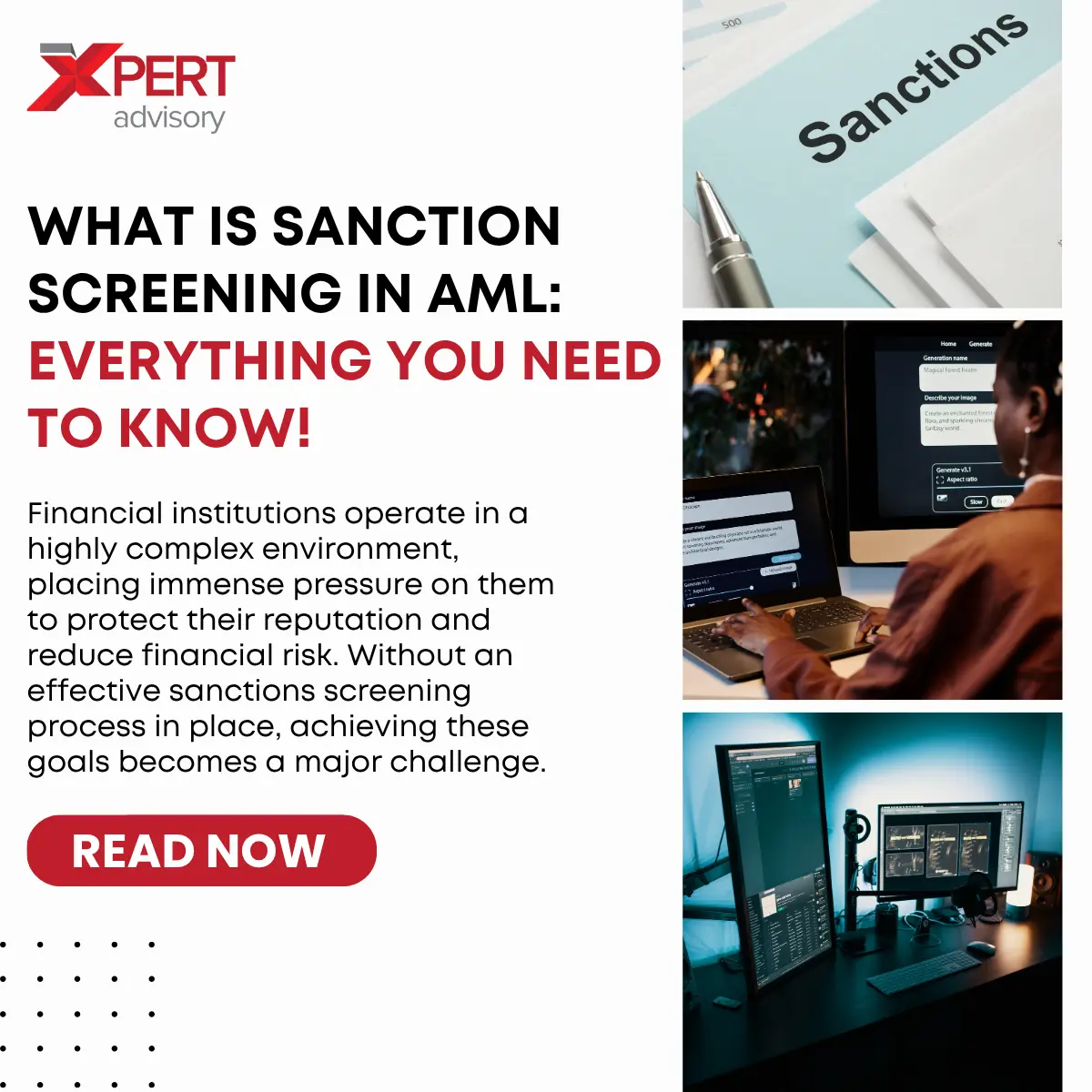Financial institutions function in a complex environment, which creates significant pressure to safeguard their reputation while minimising financial losses. Without appropriate measures from the sanctions screening process, businesses encounter substantial difficulties in achieving this objective. Governments implement sanctions as penalties to target individuals along with entities and nations which participate in illegal activities. In this blog, we’ll examine what is sanction screening in AML and how to implement it to protect your business reputation while avoiding penalties.
What is Sanctions Screening in Anti-Money Laundering?

The procedure of comparing financial data points against global sanction lists with the aim of screening entities and transactions and their related persons is known as sanctions screening. Governments and international bodies maintain blacklists which contain the financial restriction subjects who performed illegal activities.
The use of global watchlists enables institutions to detect potentially dangerous transactions and safeguard their operations from potential sanction violations. Financial institutions implement watchlists to verify their business relationships and commercial transactions through comparison procedures that prevent dangerous parties from gaining access. Such measures serve to defend your reputation and prevent substantial penalties.
Moreover, the screening of sanctions functions as the primary tool for defending against risks associated with anti-money laundering and counter-terrorism financing attacks. This practice prevents funds from reaching illegal activities while acting as a core element for ensuring global financial system stability.
What Makes Sanctions Screening Important for All Financial Institutions?
Financial institutions must perform AML sanctions screening operations because it serves as a mandatory legal obligation to protect their standing in the law.
Financial institutions must adhere to sanctions regulatory requirements because laws strongly require this obligation. The regulatory framework requires businesses to conduct extensive background examinations both for transactions and clients to confirm their absence from PEP screening lists. Failure to comply with sanction compliance rules leads to costly financial penalties together with possible legal penalties.
Moreover, financial institutions apply sanctions screening solutions for risk management to discover sanctioned entities in transactions before blocking such deals to ensure compliance with international regulations.
How Does the Sanctions Screening Process Work?
Now you know what is sanction screening in AML, let’s discuss how screening works. The method of sanction screening operates through a comparison process between customer records and official sanction record lists to verify eligibility.
Key components of a robust sanctions screening program Include:
- Customer Identity Verification: This stands as the core element of know your customer (KYC) requirements because companies need to verify client identities at account setup.
- Cross-Checking Against Multiple Lists: Sanctioned identity verification requires comparison with multiple lists that consist of sanctions names along with politically exposed persons’ lists (PEP), adverse media contents, and jurisdiction-specific watchlists.
- Manual Verification of Matches: A detailed review process verifies all matches to prevent cases of resemblances which generate false matches from identity information or names.
- Transaction Suspension and Reporting: The system suspends financial transactions automatically when one of the high-risk profiled individuals is matched, and then a report is sent to a compliance official.
- Risk Labeling and Monitoring: When sanction screening software identifies customers as high-risk, they receive continuous monitoring to reduce their potential dangers.
- Transaction-Level Monitoring: The system monitors all transactions at their level to confirm the non-usage of entities or people listed on sanctions lists.
- Internal Auditing: Regular audits through internal auditing verify that all screening protocols have proper documentation and execute their tasks effectively.
Types of Sanctions
Superior centres use sanctions as authorised legal steps to enforce behaviour modifications while protecting international relationship rules. An AML program needs this tool because it stops financial fraud and meets particular AML law requirements.
There are three different sanctions categories:
- Economic Sanctions
Economic sanctions, commonly known as embargoes, function by eliminating access to imported and exported merchandise from specific countries. The imposition of such financial measures controls both the volume and types of trade activities for any given country.
Through trade sanctions, the target nation experiences capability reduction since these measures block necessary products and services from reaching its borders.
- Diplomatic Sanctions
Such measures restrict the diplomatic activities of nations by authorising processes ranging from diplomatic demarche to envoy deportation. The international system seeks behaviour modifications through this sanction method from targeted countries.
- Military Sanctions
Military sanctions imposed on countries restrict their military forces from performing their usual operational capabilities and seizing control. The sanctions include limitations on military trade combined with investment restrictions accompanied by flying zone restrictions. Moreover, target states face military operation restrictions because such measures aim to decrease their operational potential.
- Sports Sanctions
The enforcement of sports sanctions targets the improper use of sporting events or sporting organisations to clean up criminal money. The United Nations Security Council authorised these sanctions to stop corrupt funds from gaining acceptance through sports platforms.
- Environmental Sanctions

This measure targets any party involved in major environmental crimes that combine severe pollution violations or unauthorised waste trafficking. The sanctions exist to safeguard ecological quality while preventing dangerous activities from taking place.
What is a Sanctions List?
Ever since governments teamed up with international organisations to form sanctioned lists, these entities have been accumulating persons and organisations that international law deems unacceptable, together with complete countries. The listed criminal acts involve illegal acts towards international laws while also containing human rights violations and security risks.
Parties listed as part of sanctions face three primary penalty forms: trade restrictions alongside travel bans and the restriction of accessing their assets. The introduced measures function as behavioural modification instruments which target listed parties to make changes in their actions while complying with international standards or fulfilling particular requirements.
Types of Sanctions Lists
An effective sanction screening process uses official government-imposed sanction lists to compare transactions or customer and business partnerships, which helps identify potential sanction risks. The sanctions list includes the following categories.
- UN Sanctions List
The United Nations Security Council operates this list to implement sanctions affecting countries along with entities and people who disrupt worldwide peace through their activities. The sanctions imposed restrictions on travelling activities, blocked asset holdings, and implemented trade restrictions.
- US Treasury Department Specially Designated Nationals (SDN)
United States government authorities use this list to identify parties who carry out criminal acts, including terrorism, drug trafficking, and sanctions evasion activities. The list contains provisions that enable asset freezing and block financial operations with people and institutions from the specified categories.
- EU Sanctions List
This European Union imposed list addresses individuals who perpetrate human rights abuses as well as those operating in conflict zones and committing different violations. Those who fail to obey international standards face restrictions, which include banning travel, freezing assets, and limiting trade.
- OFAC (Office of Foreign Assets Control) Sanctions List
The U.S. Department of the Treasury, through its OFAC division, maintains this list to identify parties who conduct actions contrary to United States foreign policy and security policy. Through its enforcement mechanism, the organisation imposes freezing of assets along with trade limitations and travel restriction controls.
- National Sanctions Lists
Sanction lists are dynamic, and each nation creates its own sanctions lists as a means to target entities that endanger national security or disregard domestic laws. The particular sanctions applied include asset freezes together with travel bans and trade blocks according to national interests.
- Financial Action Task Force (FATF) Blacklist
Through its efforts, the FATF produces blacklists of countries that fail to implement proper financial crime prevention measures against money laundering and terrorism funding. International financial isolation, along with increased examination, becomes a direct result of listing.
- Non-Governmental Sanctions Lists
Private organisations, together with advocacy groups, produce blacklist directories which focus on people and groups related to controversial conduct like corruption and environmental offences. These lists create public awareness while influencing the opinions of the public along with business choices.
False Positives in Sanctions Screening
When customer screening systems identify legitimate activities or entities as suspicious risks, it generates a false positive alert. A standard transaction could produce a warning signal despite having no risk factors despite being fully legitimate. Multiple factors lead to this high number of false positives.
- Broad and Sensitive Screening Criteria
Sanctions aim to implement extensive broad and sensitive matching rules that create broad screening coverage to identify all potential risks. Extended criteria result in many inaccurate alerts because numerous valid monetary transactions randomly satisfy the predefined parameters.
- Quality and Organization of Data

Data screening results are strongly influenced by the quality of utilised sanction data together with its organisational structure, which can cause false positives to emerge. Data problems such as missing information, poor organisation, or incorrect entries in the database lead to wrong identifications and unnecessary alerts.
- Complexities in Name Matching
Name matching functions as a standard approach in sanctions screening, although the methodology proves hard to operate effectively. Different spellings, together with names sharing similarities and diverse cultural naming practices along with linguistic differences, cause both mistaken identifications and fake alerts to occur during screening operations.
Tips to Implement an Effective Sanctions Screening Process
The following best practices will improve your sanctions screening program’s performance:
- The company must maintain data accuracy through robust assessment methods when clients join and by performing regular verification of member data records.
- Screen data reliably by using trustable sanction lists to reduce false detection errors. Your screening system needs regular updates of fresh data to maintain compliance standards.
- Advanced sanction screening technology must be invested in for the accurate processing of large data volumes; this combination eliminates both computer mistakes and human review requirements for false detections.
- The international; sanctions lists experience continuous evolution. Therefore, businesses need to keep up with constant updates to sanctions lists. A system should be implemented to track updates that will enable the necessary modifications to your screening procedures.
Final Words
Understanding what is sanction screening in AML will help businesses achieve both regulatory compliance standards and operational protection. Through accurate data analysis combined with advanced screening technology and constant monitoring, financial institutions decrease their violation risk and avoid costly penalties while supporting worldwide financial systems.
Modern sanction screening requirements need ideal proactive approaches and professional monitoring services to handle continuous changes in AML regulations and advanced threats. That’s where Xpert Advisory comes in. Our AML compliance consultancy services help financial institutions develop and enhance their precise sanction screening frameworks. Contact us now to maintain regulatory compliance while safeguarding your reputation!
FAQs
What are Sanctions In AML?
AML compliance procedures utilise sanctions as governing authorities from governments and international organisations establish restrictions to stop financial transactions involving illegal actors who conduct activities like money laundering as well as terrorism financing, drug activities, and human rights violations.
What is the Distinction Between Name Screening and Sanction Screening?
Financial sanction screenings run automatically before the organisation can establish new customer relationships. The screening of names operates as part of entry controls, so financial institutions gain additional chances to obtain sanction-related information for due diligence purposes.
What Procedures Take Place During the AML Screening Operations?
Paste screening names appear as a fundamental procedure to perform AML processes effectively. The process of name screening requires verification through global databases, including sanction lists, watchlists, politically exposed persons (PEP), and adverse media reports.


